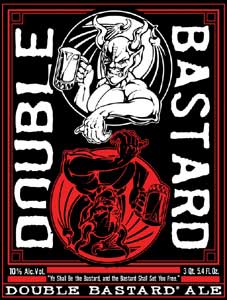home | metro santa cruz index | news | santa cruz | feature article

For Ale Lang Syne: Because sometimes one bastard just isn't enough.
Season's Bleatings
Fine ales, sophisticated goats and T-shirts are the most exclusive gifts this holiday season
By Richard von Busack
From Milan to Tuxedo Park, the most elegant seasonal gift lists, reports Pelf magazine, read simply, "1. Beer. 2. A goat. 3. Some T-shirts."
Even this simple but utterly elegant combo is deceptive. The beer isn't actually beer, it's ale. Or, better still, India Pale Ale. The most Frankensteinian brewing experiments are taking place in the fog belt between San Luis Obispo and Vancouver. The West Coast IPA style has a hugely robust hop flavor that goes with hot spices, sharp cheese, wood fires and cold nights.
Hopsickle (22 ounces, $4 or less) is decadent stuff. It's hard to find but worth it, a triple-fermented Russian Imperial from Novato's Moyans Brewery, as bitter as the world situation but far more flavorful.
A little more subtlety but just as much electricity can be found in Belgian-style Trappist ales, and they make an outstanding one in Boonville: Anderson Valley Brewery's Brother David's Triple Abbey Style Ale, sealed with a gold plastic cap, hovers at about $5 a bottle. There, the traditional subtlety of Belgian yeasts coasts into a big bitter hopslide. It's a real anodyne against cold-season misery; for $30 you could give someone a very classy six-pack.
Another showstopping strong ale at 10 percent alcohol--that means two-thirds of the way to wine--is the Stone Brewing Company's Double Bastard Ale. A toddler-sized Jeraboam (3 liters and change, $59 at BevMo and elsewhere) is sealed with a flip-top and a tiny lock to prevent the Enemy from getting their hands on it. Despite the spicy-sweet flavors, it's still just the big four of brewing, barley, water, yeast and hops--"a LOT of hops," says Stone's CEO Greg Koch by email. This big bastard of an ale comes to a soft pillowy finish, quite a surprise for a bottle of ale described as "liquid arrogance." While guzzling the more handy 1 pint, 6 ounce bottle ($4 or thereabouts), read the worthy diatribe printed on the bottle about how disgusting television advertising is. It's an essay that seemed more well-spoken with every gulp.
The Goat
Ah, the goat. For centuries, the humble yet elegant ruminant has been, to quote the romantic poet Sir Richard Meltzer, "the low comedy relief of the barnyard." Years before Atkins, this animal's roughage-heavy diet of tin cans showed us all the way to improved nutrition. But few of us have room for a goat in the living room, far less in our office space. However, the Heifer Project (www.catalog.heifer.org) shows how a goat, bought by you in the name of someone you need to gift, can be sent to where it will do the most good. Albania, for instance (and yes, no lie, they will send a goat to Albania). Presumably the goat is cleansed and gift wrapped, and the ribbons are placed out of reach of the creature's inquisitive mouth. In Albania, your goat's milk will feed the poor, and its antics will amuse the locals, especially when some soon-to-be-flying chump bends over to pick up a dropped coin. For those without the $120 for an entire goat, the charitable project will sell you a share for $10, but you don't get to choose which part.
The Heifer Project's catalog also suggests the purchase of a farmyard's worth of animals for meat, poultry or dairy product, or bees for vegetarians. Vegans, unwilling to subject their fellow human beings to the buzzing bee energy stored in deadly honey, can chip in for inedible llamas, or trees for reforestation. The catalog (800.422.0755) includes a free picture of an out-of-it-looking Walter Cronkite petting a downy chickie, suitable for framing.
T-Shirts
But what if that special someone on your seasonal gift list has already been goated and endrunkened? They have to wear something in this weather. The American Apparel store, set to open its doors on the mall on Pacific Avenue in Santa Cruz this Friday, might be the first place to look. This store sells no-sweatshop basics, made in Los Angeles; the white-walled, track-lighting-lit chain is expanding like mad throughout North America. The website (americanapparel.net) tells of Dov Charney and how he worked his way up to a company worth $178 million from selling T-shirts on the street in Montreal. Inside each branch are various outfits, the most useful and chic of shirts, underwear and casuals in an array of colors, in the under $25 range, all made by garment workers who got at least $10 and up to $15 an hour.
If it all seems too Frank Capra to be true, one could fret over the ethics of the advertisements. American Apparel's panty ads feature pouty urban amateur models of the school of Richard Kern. They get rather scandalous at times. But American Apparel's combination of integrity and sex is hard to beat; and for the holidays their clothes are quite presentable.
Send a letter to the editor about this story.